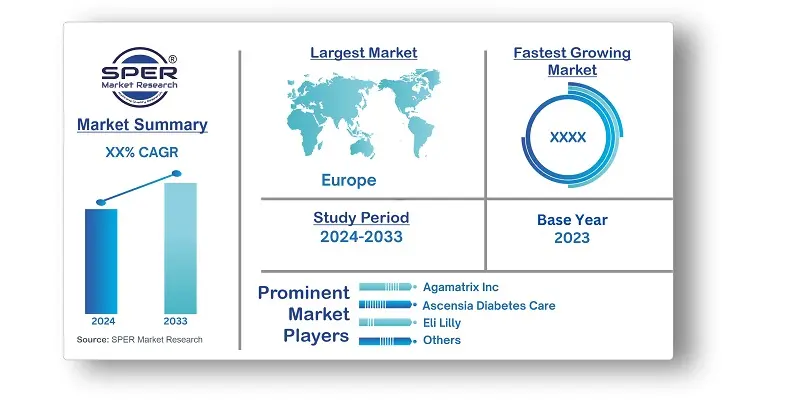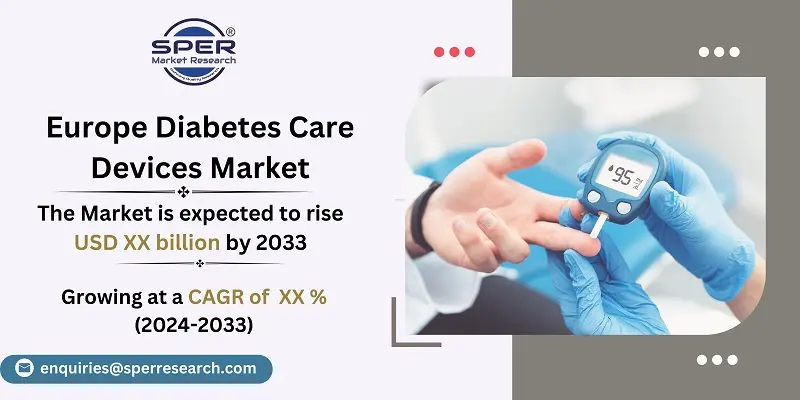
Europe Diabetes Care Devices Market Growth, Size, Trends, Demand, Revenue and Future Outlook
Europe Diabetes Care Devices Market Size- By Monitoring Devices, By Management Devices- Regional Outlook, Competitive Strategies and Segment Forecast to 2033
| Published: Apr-2024 | Report ID: MEDE2426 | Pages: 1 - 152 | Formats*: |
| Category : Medical Devices | |||
- Dexcom introduced their real-time CGM system, Dexcom ONE+, in Europe in February 2024. Three distinct body locations can be used to wear the customizable continuous glucose monitoring device Dexcom ONE+.
- June 2022: The Insulin Pen 2.0TM, the newest and most cutting-edge insulin delivery device from Cequr, the pioneer in wearable diabetes technology, was introduced. The pen has an integrated blood glucose meter that allows users to monitor their blood sugar levels throughout the day. It is tiny enough to be worn on the user's body at all times.


| Report Metric | Details |
| Market size available for years | 2020-2033 |
| Base year considered | 2023 |
| Forecast period | 2024-2033 |
| Segments covered | By Monitoring Devices, By Management Devices |
| Regions covered | UK, France, Germany, Italy, Spain, Rest of Europe |
| Companies Covered | Abbott Diabetes Care, Agamatrix Inc., Ascensia Diabetes Care, Bionime Corporation, Dexcom Inc., Eli Lilly, Insulet Corporation, Medtronic, LifeScan, Novo Nordisk A/S, Roche Diabetes Care, Rossmax, Sanofi, Others |
- Healthcare providers and professionals specializing in diabetes management
- Medical device manufacturers and suppliers
- Pharmaceutical companies involved in diabetes care
- Healthcare policymakers and regulators
- Investors and financial analysts
- Market research firms and analysts
- Diabetes advocacy groups and patient organizations
- Retailers and distributors of diabetes care products
- Academic and research institutions focusing on diabetes
| By Monitoring Devices: |
|
| By Management Devices: |
|
| By Region: |
|
- Europe Diabetes Care Devices Market Size (FY'2024-FY'2033)
- Overview of Europe Diabetes Care Devices Market
- Segmentation of Europe Diabetes Care Devices Market By Monitoring Devices (Self-monitoring Blood Glucose Devices, Continuous Glucose Monitoring Devices)
- Segmentation of Europe Diabetes Care Devices Market By Management Devices (Insulin Pump, Insulin Syringes, Cartridges in Reusable Pens, Insulin Disposable Pens, Jet Injectors)
- Expansion Analysis of Europe Diabetes Care Devices Market
- Problems and Obstacles in Europe Diabetes Care Devices Market
- Competitive Landscape in the Europe Diabetes Care Devices Market
- Impact of COVID-19 and Demonetization on Europe Diabetes Care Devices Market
- Details on Current Investment in Europe Diabetes Care Devices Market
- Competitive Analysis of Europe Diabetes Care Devices Market
- Prominent Players in the Europe Diabetes Care Devices Market
- SWOT Analysis of Europe Diabetes Care Devices Market
- Europe Diabetes Care Devices Market Future Outlook and Projections (FY'2024-FY'2033)
- Recommendations from Analyst
1.1. Scope of the report1.2. Market segment analysis
2.1. Research data source2.1.1. Secondary Data2.1.2. Primary Data2.1.3. SPER’s internal database2.1.4. Premium insight from KOL’s2.2. Market size estimation2.2.1. Top-down and Bottom-up approach2.3. Data triangulation
4.1. Driver, Restraint, Opportunity and Challenges analysis4.1.1. Drivers4.1.2. Restraints4.1.3. Opportunities4.1.4. Challenges4.2. COVID-19 Impacts of the Europe Diabetes Care Devices Market
5.1. SWOT Analysis5.1.1. Strengths5.1.2. Weaknesses5.1.3. Opportunities5.1.4. Threats5.2. PESTEL Analysis5.2.1. Political Landscape5.2.2. Economic Landscape5.2.3. Social Landscape5.2.4. Technological Landscape5.2.5. Environmental Landscape5.2.6. Legal Landscape5.3. PORTER’s Five Forces5.3.1. Bargaining power of suppliers5.3.2. Bargaining power of buyers5.3.3. Threat of Substitute5.3.4. Threat of new entrant5.3.5. Competitive rivalry5.4. Heat Map Analysis
6.1. Europe Diabetes Care Devices Market Manufacturing Base Distribution, Sales Area, Product Type6.2. Mergers & Acquisitions, Partnerships, Product Launch, and Collaboration in Europe Diabetes Care Devices Market
7.1. Europe Diabetes Care Devices Market Size, Share and Forecast, By Monitoring Devices, 2020-20267.2. Europe Diabetes Care Devices Market Size, Share and Forecast, By Monitoring Devices, 2027-20337.3. Self-monitoring Blood Glucose Devices
7.3.1. Glucometer Devices
7.3.2. Blood Glucose Test Strips7.3.3. Lancets7.4. Continuous Glucose Monitoring Devices7.4.1. Sensors7.4.2. Durables
8.1. Europe Diabetes Care Devices Market Size, Share and Forecast, By Management Devices, 2020-20268.2. Europe Diabetes Care Devices Market Size, Share and Forecast, By Management Devices, 2027-20338.3. Insulin Pump
8.3.1. Insulin Pump Devices8.3.2. Insulin Pump Reservoir8.3.3. Infusion Set
8.4. Insulin Syringes8.5. Cartridges in Reusable Pens8.6. Insulin Disposable Pens8.7. Jet Injectors
9.1. Europe Diabetes Care Devices Market Size and Market Share
10.1. Europe Diabetes Care Devices Market Size and Market Share By Region (2020-2026)10.2. Europe Diabetes Care Devices Market Size and Market Share By Region (2027-2033)10.3. France10.4. Germany10.5. Italy10.6. United Kingdom10.7. Rest of Europe
11.1. Abbott Diabetes Care11.1.1. Company details11.1.2. Financial outlook11.1.3. Product summary11.1.4. Recent developments11.2. Agamatrix Inc.11.2.1. Company details11.2.2. Financial outlook11.2.3. Product summary11.2.4. Recent developments11.3. Ascensia Diabetes Care11.3.1. Company details11.3.2. Financial outlook11.3.3. Product summary11.3.4. Recent developments11.4. Bionime Corporation11.4.1. Company details11.4.2. Financial outlook11.4.3. Product summary11.4.4. Recent developments11.5. Dexcom Inc.11.5.1. Company details11.5.2. Financial outlook11.5.3. Product summary11.5.4. Recent developments11.6. Eli Lilly11.6.1. Company details11.6.2. Financial outlook11.6.3. Product summary11.6.4. Recent developments11.7. Insulet Corporation11.7.1. Company details11.7.2. Financial outlook11.7.3. Product summary11.7.4. Recent developments11.8. Medtronic11.8.1. Company details11.8.2. Financial outlook11.8.3. Product summary11.8.4. Recent developments11.9. LifeScan11.9.1. Company details11.9.2. Financial outlook11.9.3. Product summary11.9.4. Recent developments11.10. Novo Nordisk A/S11.10.1. Company details11.10.2. Financial outlook11.10.3. Product summary11.10.4. Recent developments11.11. Roche Diabetes Care11.11.1. Company details11.11.2. Financial outlook11.11.3. Product summary11.11.4. Recent developments11.12. Rossmax11.12.1. Company details11.12.2. Financial outlook11.12.3. Product summary11.12.4. Recent developments11.13. Sanofi11.13.1. Company details11.13.2. Financial outlook11.13.3. Product summary11.13.4. Recent developments11.14. Others
SPER Market Research’s methodology uses great emphasis on primary research to ensure that the market intelligence insights are up to date, reliable and accurate. Primary interviews are done with players involved in each phase of a supply chain to analyze the market forecasting. The secondary research method is used to help you fully understand how the future markets and the spending patterns look likes.
The report is based on in-depth qualitative and quantitative analysis of the Product Market. The quantitative analysis involves the application of various projection and sampling techniques. The qualitative analysis involves primary interviews, surveys, and vendor briefings. The data gathered as a result of these processes are validated through experts opinion. Our research methodology entails an ideal mixture of primary and secondary initiatives.



Frequently Asked Questions About This Report
PLACE AN ORDER
Year End Discount
Sample Report
Pre-Purchase Inquiry
NEED CUSTOMIZATION?
Request CustomizationCALL OR EMAIL US
100% Secure Payment






Related Reports
Our Global Clients
Our data-driven insights have influenced the strategy of 200+ reputed companies across the globe.




















